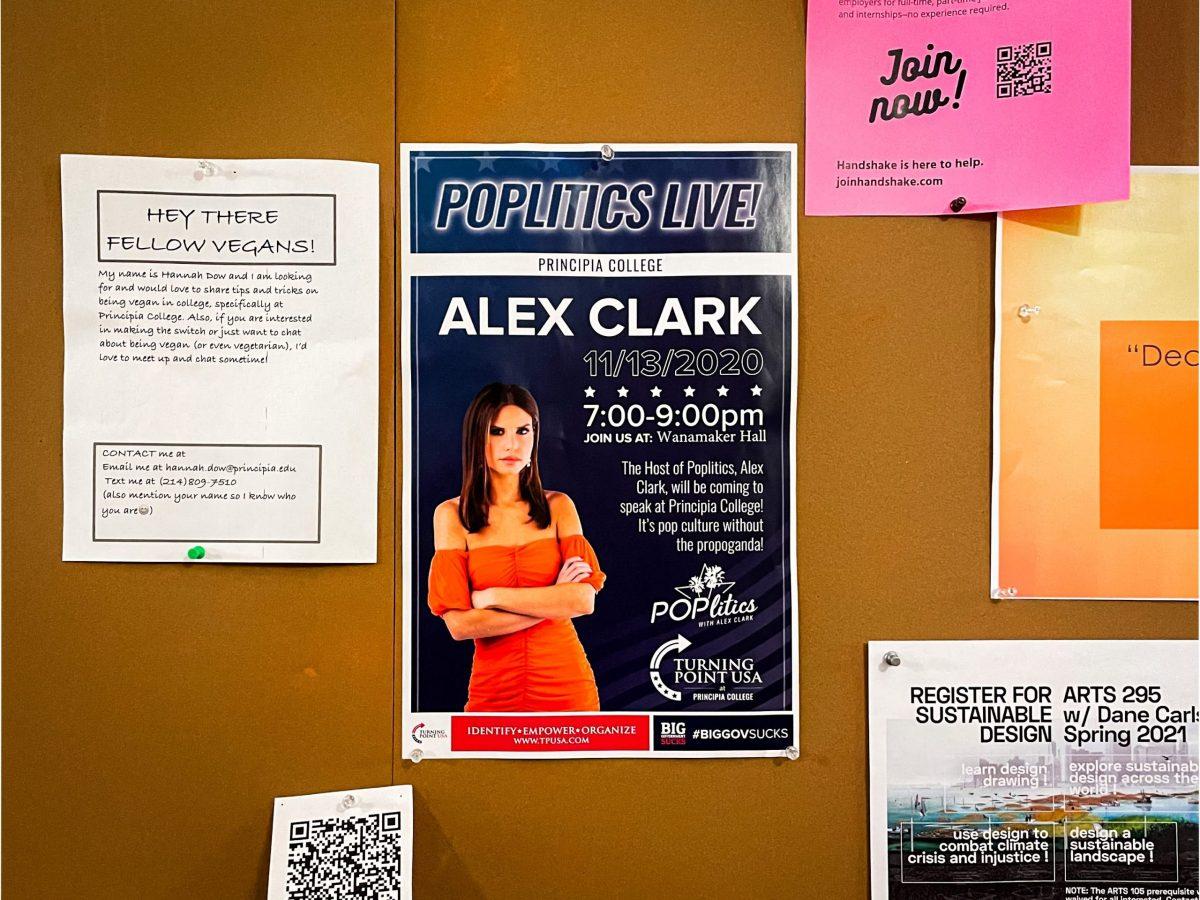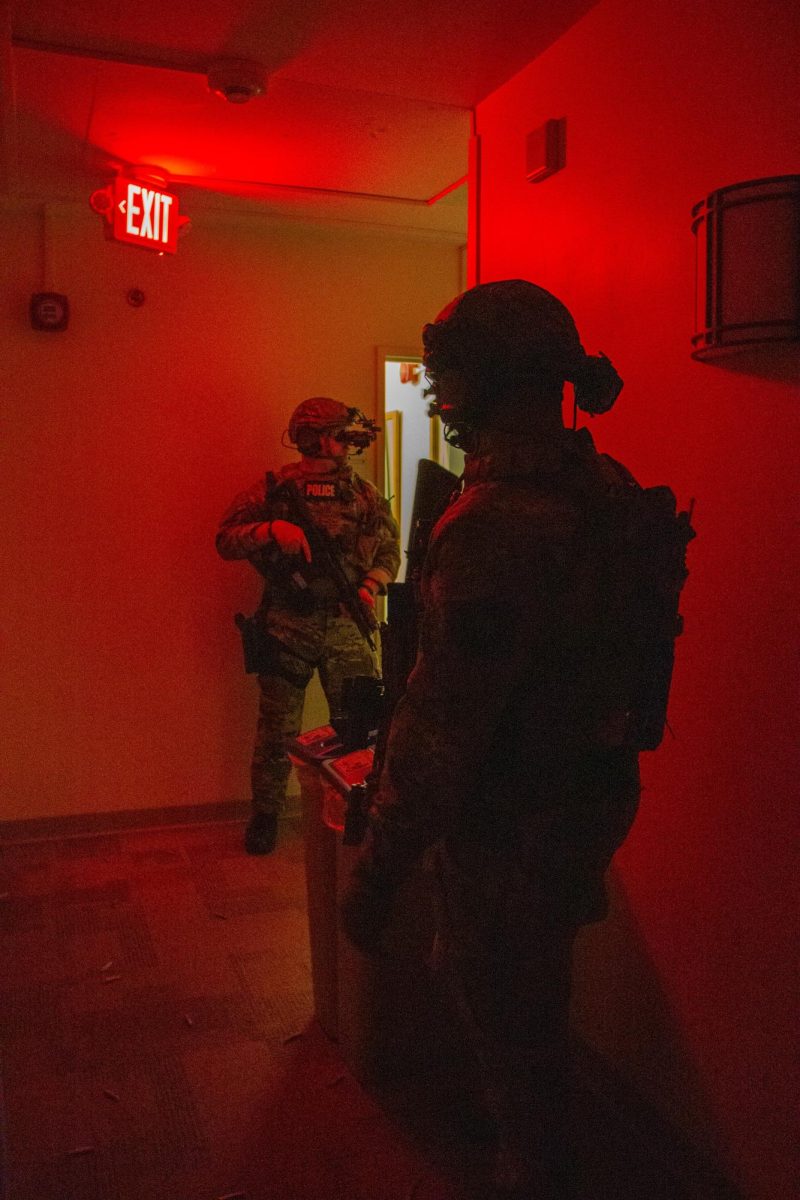By Sophie Hills
Tension erupted this week in two since-deleted comment threads on The Principia Bluffs, the Facebook group for Principia students and community members, regarding an event to take place on campus tonight, Nov. 13. Turning Point at Principia College – an on-campus chapter of the national organization which promotes conservative ideology and connects students – is hosting Alex Clark, the host of the national organization’s daily show, POPlitics.
POPlitics covers pop culture “without the propaganda with the bonus of wit and humor,” according to Turning Point’s website.
The event, planned to take place at 7 p.m. in Wanamaker Hall, will only be open to 10 people in Wanamaker and 10 in Leonard Hall, including Clark, Dean of Students Maya Dietz, Head of Security Matthew Brill, and Turning Point board members. It will also be broadcast over Zoom.
After a student tested positive for the coronavirus on Thursday, Nov. 12, the campus reverted to Orange Phase, which means that students must now wear masks in dorms and may not leave campus. On-campus indoor gatherings are limited to 10 people. Clark is still permitted to come, having been vetted and approved by the coronavirus task force led by David Pate, director of workplace safety.
“Both the members and the speaker have agreed to follow all of our COVID protocols,” said Dean of Students Maya Dietz in a town hall today, “and they’ve decided they wanted to continue even with a small in-person audience.”
Early in the week, several students reported to Dietz their safety concerns following the discovery of photos on Instagram showing an unmasked Alex Clark attending what appeared to be a protest to stop the vote count outside the Maricopa County Elections Department in Arizona. No one in the photos was masked.
The photos were posted on Nov. 6, but given that the signs held by protestors called to ‘Count Legal Votes,’ and ‘Protect the Vote Arizona,’ they were most likely taken no earlier than Election Day, Nov. 3, which was not two weeks before today, when Clark is due to arrive on campus. Per the CDC, two weeks is the recommended amount of time a person should isolate after possibly being exposed to the virus.
According to reports from the Arizona Department of Health Services, coronavirus cases in Arizona have been steadily rising since mid-September, and Maricopa County – which surrounds Phoenix – accounts for 171,000 of the 267,000 virus cases in the state. As the United States sees a nationwide surge in cases, Arizona is seeing the virus spread at its fastest rate since June, although case numbers haven’t surpassed the summer’s.
While the coronavirus task force “does not do pre-screening on visitors, we expect visitors to abide by Principia’s expectations, policies, and protocols when on campus. We do ask visitors, contractors, and others to complete the standard daily screening protocol completed by students, faculty, and staff, prior to coming onto campus,” wrote Pate, the director of workplace safety, in an email interview.
Students are still expected to self-isolate for three days and wear a mask for 11 more in their dorm after traveling back from outside of the St. Louis-metro area, and are asked not to attend gatherings where social distancing guidelines aren’t being observed. The same is asked of staff and faculty. For her part, Clark is expected to isolate in the Guest House on Friday from the time she arrives until the event, and then from the end of the event to the time she leaves.
Clark is coming from out of state, and neither Madison nor Jersey County requires travelers from out-of-state to isolate for any period of time upon arrival.
Clark contracted “the virus a month ago,” says senior Dean Colarossi, president of Turning Point at Principia College. She has since “tested negative multiple times and she’s been cleared by the [coronavirus task force] to come on campus,” he says.
There’s a process for speakers to visit the campus under COVID protocols, which involves processing the request up through the department in question – in this case, Student Life – and finally to the task force. Turning Point followed that process.
The second issue raised by students has to do with speech. In recent years, college campuses have served as hotbeds for debate over free speech. At the moment, the president of Northwestern University has condemned student protests when they turn violent, as students demonstrate on and off campus in an effort to abolish the university’s police, while Middlebury College was the site of well-publicized, and at times violent, protests over a speaker in 2017.
According to a recent study by research firm College Pulse, as well as RealClearEducation and the Foundation for Individual Rights in Education, 51% of students at schools ranked between 50 and 99 on the U.S. News Scale identify as liberal, compared to 26% who identify as conservative.
Two-thirds of college students nationwide believe it is acceptable to remove flyers and announcements advertising speakers with whom they disagree, according to College Pulse. This has been happening at Principia over the week, as students remove posters advertising Clark’s show.
Some students expressed concerns about the contents of Clark’s Instagram account. In one video, Clark is seen saying “China did this,” alluding to the coronavirus. She also reposted an article praising Florida Gov. Ron DeSantis for proposing “anti-mob” legislation that would allow Florida residents to use firearms on “suspected looters,” and promoted a book titled ‘Irreversible Damage: The Transgender Craze Seducing Our Daughters.’
Two students, juniors Grace St. George and Olivia Burbee, invited Turning Point to a formal mediation session – mediated by the captain of the Mediation Team – on Nov. 12 to attempt to resolve the tensions on campus by having Clark speak just over Zoom. Turning Point declined, saying that the invitation, sent late on Nov. 11, was too short-notice.
“I discussed [the invitation] with our board of directors and our faculty member, and we really just got blindsided by that at the last second,” says Colarossi. “I think that it’s a great way to resolve problems,” if the email had been sent sooner.
Colarossi also alleged that the email thread contained threats towards Turning Point, but he did not expand on them. “If they would have addressed it with me maybe over the phone, or in-person somehow, instead of sending repeat emails, we maybe could have come to a compromise there and had that mediation,” he says. Instead, Colarossi is open to a mediation session next week.
“The people who have talked to me privately, I’ve really appreciated being able to communicate with them and allay their fears and explain to them the precautions we’ve taken that…have made this event possible and are going to make it a wild success.”
After being invited by St. George to join the mediation session with Turning Point, “I accepted … [because] I’m an advocate for mediation as a tool to resolve conflict, and I do think that having Clark speak on campus brought up a lot of concerns within our community,” says Burbee. “I figured that this would be a nice avenue to advocate and resolve this dispute in a non-confrontational and peaceful way.”
As St. George is also an advocate for the mediation team, Burbee says, “her focus was on advocating for the greater community and not threatening the Turning Point club.”
Greater concern didn’t arise until students realized this week that Clark was speaking in-person, not just on Zoom, and that’s why mediation wasn’t suggested sooner, she says.
Meanwhile, Dietz has stated strongly, several times, that Principia will protect both students’ right to free speech, and right to protest. “We support students learning how best to affect change,” Dietz says. In doing that, “I want to encourage people to start with the assumption of goodwill about other people.”
“Having a constructive dialogue gets us further, because we can address the rumors first, and then we can deal with the deeper-level issues,” Dietz says.
College is an opportunity to learn what’s effective, she says. “Is sparring on social media effective for building understanding?”
Learning how to effectively organize and protest, educate peers, and counter messages with which you disagree is important, and “I would encourage students to engage in those kinds of activities,” she added.
For his part, Colarossi was frustrated by the threads on social media.
“I think addressing things privately with individuals and talking to them either face-to-face or on the phone… is the best avenue” for decreasing tension, he says.
“Sometimes with the rampant and crazy gaslighting that has happened on social media…this week, that has really put a wrench in that plan to allay fears by private conversation because everyone hides behind their devices and they refuse to talk in-person,” Colarossi says.
He respects students’ concerns, he says, “however, the way to address them is not through social media. It is to talk to us directly. And maybe, just maybe, we could’ve allayed some of those concerns beforehand before they posted it and lit up the campus, if you will, online.”
Junior Haley Martin respects free speech, but she also has concerns that stem from Clark’s posts about carrying guns. From Martin’s perspective, some of Clark’s posts and rhetoric promote gun violence, like her statement that, “A 9MM beats 9-1-1 every time.” Martin remembers when a shooter targeted the synagogue by her house in San Diego, and once spent four hours in lockdown at a school during an attempted shooting.
“I don’t feel comfortable with guns on campus because I’ve had to go through something like that,” says Martin.
She also feels uncomfortable with Clark visiting campus when she’s careless with social distancing. Martin’s father is vulnerable to the virus, she says. “If I bring it home to him, I could put him in the hospital.”
Martin, who posted her concerns on The Principia Bluffs page but has since deleted the post, says conversations with people who hold opposing viewpoints need to be had.
“The only issue that we’re having is that it’s really hard to fact check each other when the other side, if you will, won’t even listen to facts,” she says. “What do you do when you present someone with information and data to back it up, and they just believe it’s fake?”
As a biology major, she’s used to research and feels confident researching the claims Clark makes on her Instagram. “Just looking at her very surface-level posts, I know for a fact that she posts out of opinion and then claims it to be facts and science, which is really dangerous,” says Martin.
One student, rather than enter into the fray of social media debate, has already posted a link to a document on which he will fact-check political assertions made by Clark in live time. The document already contains fact-checked statements from her Instagram.
Martin, despite her frustrations, still sees hope. “Having a big discussion with a political science professor, and maybe a science professor to help fact-check things that are being said” could be productive.
Featured photo is of a poster in the Howard Center advertising the talk on November 13 at 7 p.m. Photo by John Woodall.



